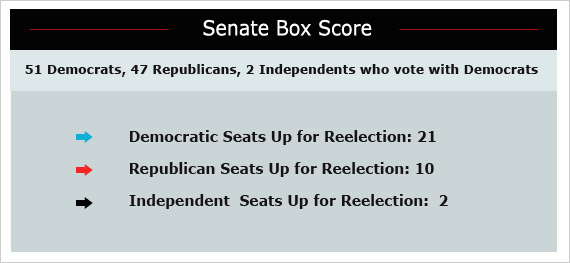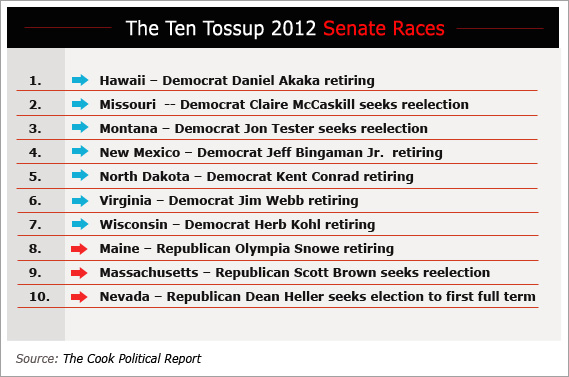Just six months ago, Republicans appeared well on their way to winning back control of the Senate for the first time in six years. Sen. John Cornyn of Texas signed up for a second tour as chairman of the Republican campaign committee just to be on hand for the historic transfer of power in the November 2012 election, and GOP leaders speculated on what they might achieve with control of both chambers of Congress.

“My goal is to get us back in the majority,” Cornyn told The Fiscal Times last summer. “I’ll be disappointed [with any other result]—that’s the reason I took the job a second time.”
Today, the Republicans still have the upper hand and may well pick up the four seats they will need to claim a bare 51 to 49-seat majority in the Senate. Democrats must defend 23 of 33 seats on the ballot, and at least ten of those contests are considered too close to call. Moreover, six veteran Democrats or Democratic leaning senators are retiring – including Budget Committee Chairman Kent Conrad of North Dakota, Ben Nelson of Nebraska, James Webb of Virginia and Herb Kohl of Wisconsin -- leaving those seats vulnerable to GOP pickups.
“I still think that we have the advantage,” Sen. Kay Bailey Hutchison of Texas, a former GOP leader and strategist who is retiring this year, told The Fiscal Times. Hutchison says the rash of Democratic retirements combined with strong voter antipathy to President Obama’s health care, energy and regulatory policies will hurt Democrats in many parts of the country. “Sen. Cornyn has said we are shooting for four [pickups] because that’s what we need, but I think there’s a good chance for six,” she added.
But an improving economy and significant uptick in President Obama’s popularity have transformed the political landscape to the point that Democrats believe they have a fighting chance of hanging on to power by a thread.

“We’re doing well considering where we started, having to protect 23 seats to 10 for the Republicans,” said Sen. Benjamin Cardin, D-Md. “There are more seats in play that we thought would not be in play, and almost all of those are seats that we can now win that we previously felt we could not win.”
One hopeful sign for Democrats is that they’re leading Republicans in fundraising, although the GOP is beginning to close the gap. The Democrats have raised a total of $52.3 million, compared to $50.5 million for the Republicans, according to the Center for Responsive Politics. And political twists in a handful of states including Maine and Nebraska have greatly complicated the Republicans effort to take back the Senate.
“It definitely looks less bleak for the Democrats, but this is not over yet,” said Jennifer Duffy, an expert on Senate politics for The Cook Political Report. “And where they’ve gotten some traction, they haven’t gotten any guaranteed wins.”
The Democrats currently hold a flimsy majority in the Senate, with 53 seats – including two held by independents Joseph Lieberman of Connecticut, who is retiring, and Bernie Sanders of Vermont. The Republicans, with 47 seats, would need a net pick up of at least four seats to regain control and replace Majority Leader Harry Reid of Nevada with Minority Leader Mitch McConnell of Kentucky.
As Duffy sees it, Republicans have the chance of picking up between two and five seats among the 10 “tossup” states of Hawaii, Missouri, Montana, New Mexico, North Dakota, Virginia, Wisconsin, Maine, Massachusetts and Nevada.
Democrats Claire McCaskill of Missouri and Jon Tester of Montana are widely considered to be among the most endangered incumbents, running in highly conservative states where Obama’s policies are highly unpopular.
Missouri has gotten more Republican in the last four years, according to Duffy, and McCaskill probably will be unable to match her performance of six years ago in amassing big votesl in suburban St. Louis and Kansas City and in rural areas.
Tester is considerably more popular than his challenger, Rep. Denny Rehberg, but he has been hurt in conservative Montana by voting with Obama 95 percent of the time, according to a Congressional Quarterly analysis, including support for the 2010 health reform bill, the 2009 economic stimulus bill and confirmation of Obama's two U.S. Supreme Court nominees.

Meanwhile, Republican senators Dean Heller of Nevada and Scott Brown of Massachusetts are facing tough challenges as well. Heller was appointed to succeed disgraced Republican John Ensign, who resigned in a messy sex scandal and faces a tough challenge from Rep. Shelley Berkley, D-Nev.
Nevada Democrats are trying to cut a deal with Republicans similar to one that Brown and Democrat Elizabeth Warren agreed to in Massachusetts, to keep unlimited third-party cash out of the race. Berkley called her plan “Free Nevada” when she made the offer to Heller, but so far, there is no sign of agreement.
Brown is the highly popular moderate Republican and former state legislator who won a special election in 2010 to succeed the late Democratic Sen. Edward M. Kennedy. Brown has made important inroads with blue-collar “Reagan Democrats” in industrial areas, but is feeling the heat from Warren, the Harvard Law professor and liberal darling who is raising a lot of money and catching up with Brown in the polls.
For a while, conservative Nebraska was considered a sure pick up for the Republicans after middle of the road Democratic Sen. Ben Nelson decided to retire. Republican state’s attorney general John Bruning was seen as the frontrunner and likely winner to succeed Nelson. But that was before Bob Kerrey, the former Democratic senator and governor and a heavily decorated Vietnam War veteran, decided to make a political comeback.
Kerry has given the Democrats some renewed hope. But Bruning already is attacking Kerrey for having spent the past decade as president of a liberal college in New York City and for saying that Obama’s health care reform law didn’t go far enough.
Finally, with the recent unexpected retirement of moderate Republican Olympia Snowe, Maine has been thrust into a three way race between a Democrat, a Republican and a very strong independent candidate, former governor Angus King, who refuses to say which party he would caucus with if he is elected to the Senate.
The highly popular former two-term governor has said that if he is elected, he won’t decide which party caucus to join before he arrives in Washington after the November election. If the Senate is more narrowly divided than it is now after the vote, King could well decide which party will be able to claim the majority. And in that case, he would be aggressively wooed by both parties with promises of top committee assignments and other perks.
“Angus King could be kingmaker here,” Duffy said. “In a closely divided Senate, does he decide who the majority party is? Maybe.”




